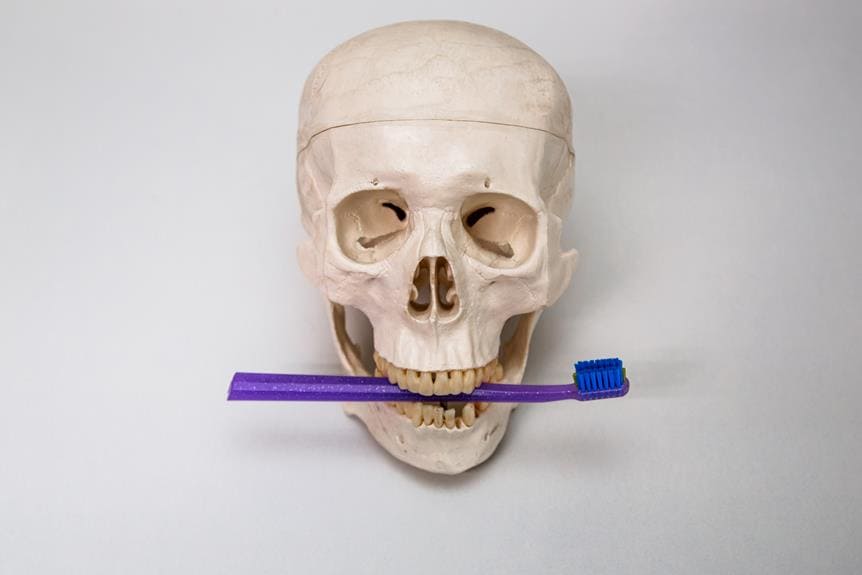Is Osteoporosis and How to Prevent Bone Loss

Osteoporosis, a prevalent bone disease affecting millions worldwide, presents a significant public health concern. With its silent and often undetectable nature, the importance of prevention and early intervention cannot be overstated.
This article aims to educate and empower individuals by providing a comprehensive understanding of osteoporosis and practical strategies for preventing bone loss. By implementing evidence-based recommendations, readers can take proactive steps to safeguard their skeletal health and lead fulfilling, active lives.
Together, let us prioritize serving ourselves and others through knowledge and prevention.
Key Takeaways
- Regular exercise, especially weight-bearing and resistance exercises, helps maintain and improve bone density.
- A balanced diet rich in calcium, vitamin D, and essential nutrients is important for maintaining bone density.
- Lifestyle choices such as avoiding smoking, excessive alcohol consumption, and a sedentary lifestyle can contribute to bone loss.
- Monitoring bone health regularly, prescribing appropriate supplements, and exploring alternative medications and treatments can help prevent and manage osteoporosis and bone loss.
Risk Factors for Osteoporosis
One of the key risk factors for osteoporosis is a lack of calcium intake during adolescence and young adulthood. Adequate calcium intake is crucial for building strong bones and reducing the risk of osteoporosis later in life. It is important to educate individuals about the importance of calcium-rich foods such as dairy products, leafy greens, and fortified foods, as well as the need for supplementation if necessary.
Other risk factors for osteoporosis include a family history of the disease, advanced age, female gender, low body weight, smoking, excessive alcohol consumption, and lack of physical activity. Prevention strategies for osteoporosis include maintaining a balanced diet rich in calcium and vitamin D, engaging in weight-bearing exercises, avoiding tobacco and excessive alcohol use, and getting regular bone density screenings.
Understanding Bone Density
Understanding bone density is crucial in assessing an individual's risk of developing osteoporosis. Factors such as age, gender, and genetics play a significant role in determining bone density.
Additionally, regular exercise, especially weight-bearing and resistance exercises, is essential for maintaining and improving bone density.
Factors Affecting Bone Density
The decline in bone density after menopause is primarily attributed to hormonal changes occurring during this stage of life. Hormones play a crucial role in maintaining bone health and density.
However, several factors can affect bone growth and density, including:
- Diet: A balanced diet rich in calcium, vitamin D, and other essential nutrients is crucial for optimal bone health.
- Physical Activity: Regular weight-bearing exercises, such as walking or strength training, can help strengthen bones and prevent bone loss.
- Lifestyle Choices: Smoking, excessive alcohol consumption, and a sedentary lifestyle can negatively impact bone density.
Understanding these factors and taking proactive measures to address them is essential for preventing bone loss and promoting overall bone health. By incorporating a nutritious diet, engaging in regular exercise, and making healthy lifestyle choices, individuals can reduce their risk of developing osteoporosis and maintain strong, healthy bones.
Importance of Regular Exercise
Engaging in regular weight-bearing exercises, such as walking or strength training, is crucial for maintaining optimal bone density and preventing bone loss. Regular exercise benefits bone health by stimulating the cells responsible for bone formation, increasing bone mass, and improving overall bone strength.
Weight-bearing exercises, where your body works against gravity, are particularly effective in promoting bone health. These types of exercise include walking, jogging, dancing, and aerobics. They put stress on the bones, which stimulates the production of new bone tissue.
Strength training exercises, such as lifting weights or using resistance bands, also play a significant role in maintaining bone density. These exercises help build muscle strength, which indirectly benefits bone health.
It is important to consult with a healthcare professional or a certified trainer to develop a personalized exercise program that suits your fitness level and goals.
Importance of Calcium and Vitamin D
Adequate intake of calcium and vitamin D is crucial for maintaining strong bones and reducing the risk of fractures. To ensure that you are getting enough of these essential nutrients, consider the following:
- Include calcium-rich foods in your diet such as milk, cheese, yogurt, leafy greens, and fortified plant-based milk alternatives.
- Expose yourself to sunlight for about 10-15 minutes daily to promote vitamin D synthesis in the body.
- Consider supplements if you are unable to meet the recommended daily intake of calcium and vitamin D through diet alone.
By following these practices, you can support optimal bone health and reduce the risk of osteoporosis.
Exercise and Its Impact on Bone Health
Regular physical activity, including weight-bearing exercises like walking and resistance training, promotes bone density and strength. When it comes to maintaining good bone health, exercise plays a vital role alongside proper nutrition. The impact of nutrition on bone health cannot be underestimated, as it provides the necessary nutrients for bone formation and maintenance. Consuming a balanced diet rich in calcium, vitamin D, and other essential nutrients is crucial for optimal bone health.
In addition to nutrition, weight-bearing exercises have numerous benefits for bone health. These exercises exert a force on the bones, stimulating them to become stronger and denser. Weight-bearing exercises include activities such as walking, jogging, dancing, and weightlifting. They help to maintain bone mass and prevent bone loss, reducing the risk of osteoporosis and fractures. Incorporating weight-bearing exercises into a regular exercise routine can have a significant positive impact on bone health.
The following table highlights the impact of nutrition and the benefits of weight-bearing exercises on bone health:
| Nutrition | Benefits of Weight-Bearing Exercises |
|---|---|
| Calcium | Stimulates bone formation and growth |
| Vitamin D | Enhances calcium absorption |
| Protein | Supports bone tissue repair |
| Magnesium | Aids in the activation of vitamin D |
| Vitamin C | Promotes collagen production |
Lifestyle Habits That Contribute to Bone Loss
Several sedentary behaviors, such as excessive screen time and prolonged sitting, have been shown to have a detrimental impact on bone health, contributing to bone loss. Making certain lifestyle changes and focusing on nutrition can help prevent bone loss and maintain strong, healthy bones.
Here are some practical tips to incorporate into your daily routine:
- Stay active: Engage in weight-bearing exercises like walking, jogging, or dancing to stimulate bone growth and strength.
- Get enough calcium: Include dairy products, leafy greens, and fortified foods in your diet to ensure adequate calcium intake.
- Boost vitamin D levels: Spend time outdoors to promote natural production of vitamin D or consider taking supplements.
- Limit alcohol and caffeine: Excessive consumption of alcohol and caffeine can interfere with calcium absorption and contribute to bone loss.
Medications and Their Effects on Bone Health
Certain medications can have a significant impact on bone health, leading to medication-induced bone loss. It is important to be aware of these effects and take preventive measures to minimize the risk.
Additionally, exploring alternative treatment options that have a lesser impact on bone health may be beneficial for individuals at risk of osteoporosis.
Medication-Induced Bone Loss
The article explores the potential impact of medication-induced bone loss on overall bone health and discusses various medications and their effects. Medication side effects, such as hormone replacement therapy, can have a significant impact on bone health and increase the risk of osteoporosis.
Some medications, like corticosteroids, can cause bone loss by interfering with the balance of bone formation and resorption. Antidepressants, such as selective serotonin reuptake inhibitors (SSRIs), have also been linked to bone loss.
Additionally, certain cancer treatments, like chemotherapy and hormone therapies, can lead to bone loss. It is important for healthcare professionals to be aware of these medication side effects and to consider bone health when prescribing medications.
Prevention Strategies for Medications
One important aspect to consider when discussing prevention strategies for medications and their effects on bone health is the potential impact of medication-induced bone loss. Certain medications, such as corticosteroids and some anticonvulsants, have been linked to an increased risk of osteoporosis and fractures. It is crucial for healthcare professionals to be aware of these risks and take proactive measures to prevent bone loss in patients who require long-term medication use.
In addition to monitoring bone health and prescribing appropriate supplements, healthcare providers can also explore alternative treatment options that may have a lesser impact on bone density. These may include physical therapy, exercise programs, and dietary modifications. By incorporating a comprehensive approach to patient care, healthcare professionals can help minimize the negative effects of medications on bone health and improve overall quality of life.
| Prevention Strategies for Medications | Alternative Treatment Options |
|---|---|
| Monitor bone health regularly | Implement physical therapy |
| Prescribe appropriate supplements | Encourage exercise programs |
| Explore alternative medications | Promote dietary modifications |
Alternative Treatment Options
Healthcare providers should consider exploring alternative treatment options, such as physical therapy and exercise programs, to minimize the impact of medications on patients' bone health. By incorporating alternative therapies and natural remedies, providers can provide a more holistic approach to managing osteoporosis and preventing bone loss.
Here are three sub-lists of alternative treatment options that can be considered:
- Physical Therapy:
- Weight-bearing exercises to improve bone density.
- Balance and coordination exercises to prevent falls and fractures.
- Posture and body mechanics training to reduce the risk of fractures.
- Nutrition and Supplements:
- Calcium and vitamin D-rich foods to support bone health.
- Herbal supplements like horsetail and red clover, known for their bone-strengthening properties.
- Omega-3 fatty acids from sources like fish oil to reduce inflammation and promote bone health.
- Mind-Body Therapies:
- Yoga and tai chi to improve balance, strength, and flexibility.
- Meditation and relaxation techniques to reduce stress and improve overall well-being.
- Acupuncture to alleviate pain and support bone health.
Preventive Measures for Osteoporosis
Implementing regular weight-bearing exercises as part of an individual's daily routine is an effective preventive measure for osteoporosis. Along with exercise, following dietary recommendations can further support bone health and reduce the risk of developing osteoporosis. Here are some preventive measures and dietary recommendations that can help maintain strong and healthy bones:
| Preventive Measures | Dietary Recommendations |
|---|---|
| Regular weight-bearing exercises | Consuming adequate calcium and vitamin D |
| Avoiding smoking and excessive alcohol consumption | Eating a balanced diet rich in fruits and vegetables |
| Maintaining a healthy body weight | Limiting intake of caffeine and carbonated drinks |
Frequently Asked Questions
Can Osteoporosis Be Completely Prevented?
While complete prevention of osteoporosis may not be possible, adopting osteoporosis prevention strategies such as maintaining a balanced diet rich in calcium and vitamin D, engaging in regular weight-bearing exercise, and avoiding tobacco and excessive alcohol consumption can significantly reduce the risk of bone loss.
Can Men Develop Osteoporosis?
Men's susceptibility to osteoporosis is often underestimated. Risk factors such as age, low testosterone levels, and certain medications contribute to bone loss. Encouraging regular exercise, a balanced diet, and adequate calcium and vitamin D intake can help prevent osteoporosis in men.
Can Osteoporosis Be Reversed?
Reversing osteoporosis is possible through a combination of lifestyle changes and medical interventions. Natural remedies for bone loss, such as regular exercise, a balanced diet rich in calcium and vitamin D, and appropriate supplementation, can help promote bone health.
Can Certain Foods Help Prevent Osteoporosis?
Foods for stronger bones are an important aspect of preventing osteoporosis. Nutritional tips for preventing this condition include consuming calcium-rich foods such as dairy products and leafy greens, as well as foods high in vitamin D like fatty fish and fortified cereals.
Can Stress Affect Bone Health?
Chronic stress can have detrimental effects on bone density. It is important to manage stress through strategies such as exercise, relaxation techniques, and seeking support. These measures can promote better bone health.








